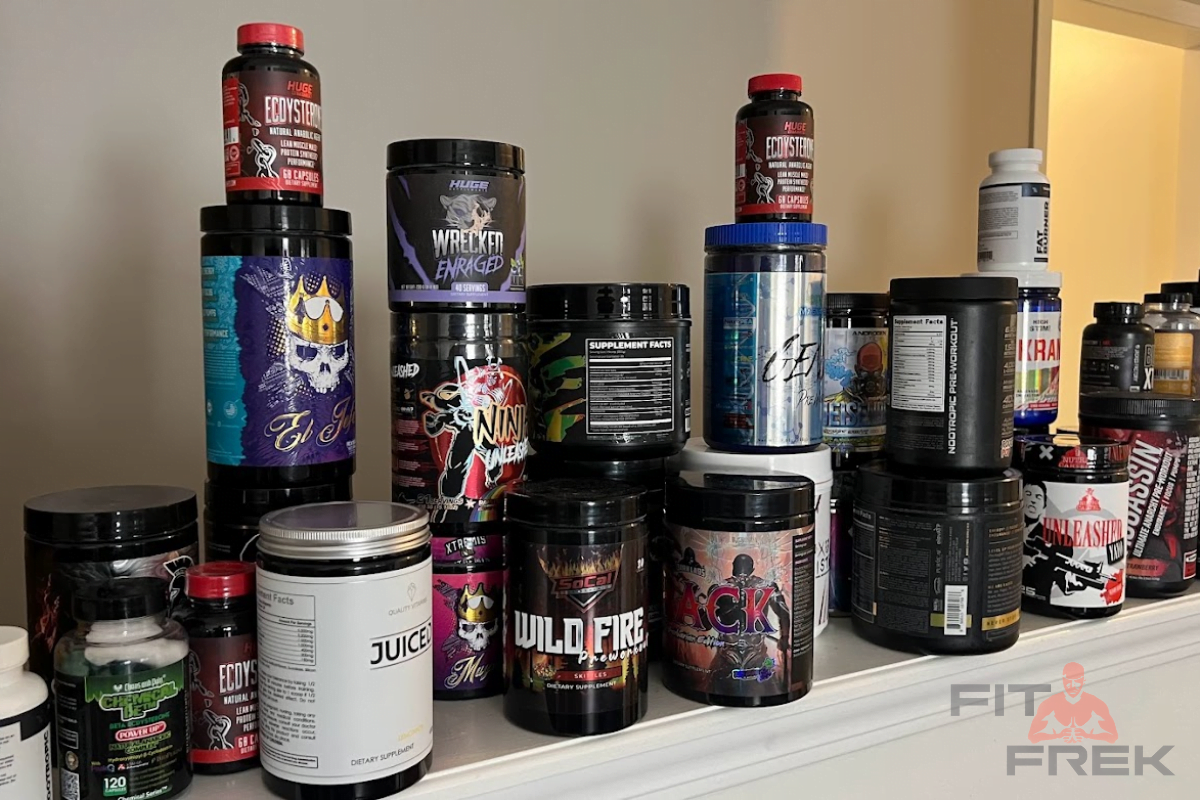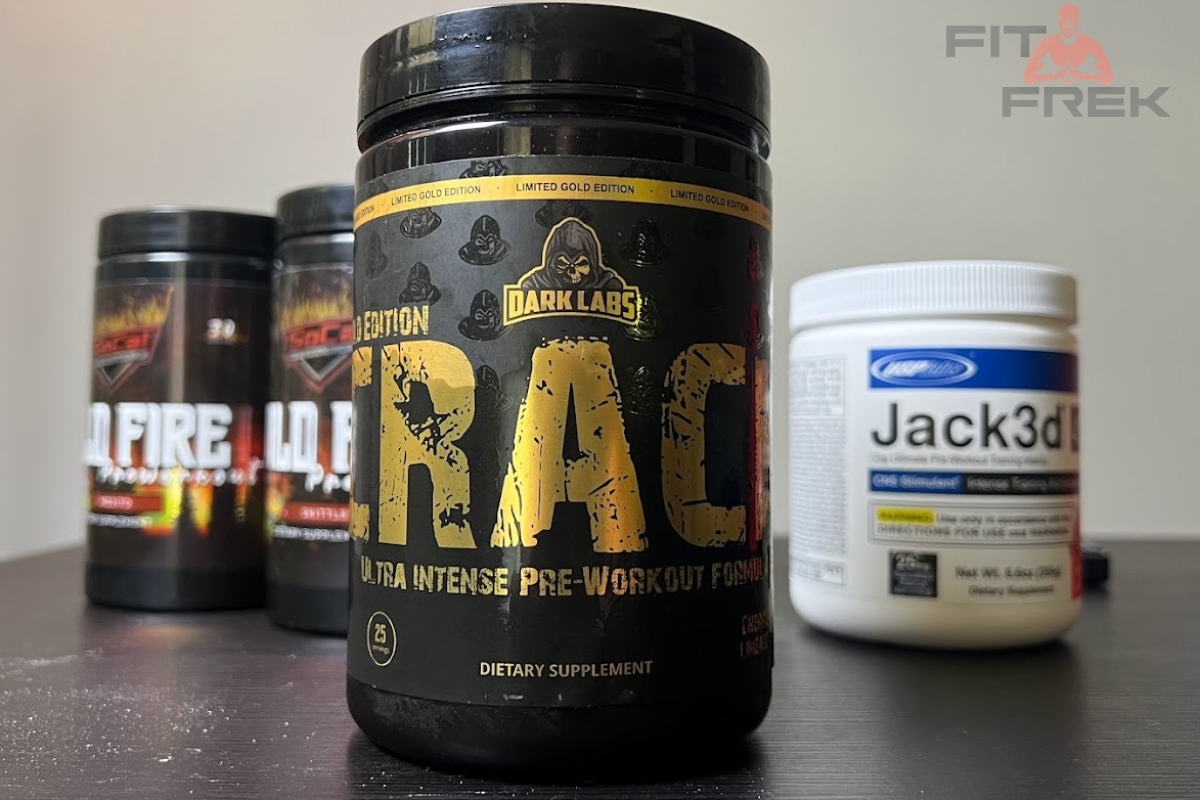
DMAA, or 1,3-dimethylamylamine, is grabbing headlines and stirring up a storm in the fitness world.
Why?
Because it's a powerhouse stimulant that's making waves in pre-workout and weight-loss supplements.
People are turning to DMAA for that extra kick of energy, sharper focus, and to push their athletic performance to new heights.
But here's the catch: DMAA is also at the center of some pretty heated debates about its safety and whether it's legal to use.

This article cuts through the noise to provide you with a clear, comprehensive understanding of DMAA.
From its benefits and potential risks to its legal status and safe usage guidelines, we've got you covered.
Whether you're considering DMAA to elevate your workout routine or simply curious about its effects, you'll find the answers here.

Hey there, I'm just like you.
I started my fitness journey way back in 2004, barely tipping the scales at 100lbs.
Fast forward through years of sweat, dedication, and a whole lot of learning, I've packed on muscle and now weigh in at a solid 200lbs.
My passion for fitness didn't just stop with my own transformation. In 2013, I launched FitFrek to share what I've learned and help others navigate the complex world of fitness and supplements.
Why? Because I've been in your shoes, and I know the challenges and questions you face.
My relationship with pre-workouts and supplements, including DMAA, dates back to 2007.
Over the years, I've navigated the vast landscape of products, distinguishing between those that offer genuine benefits and those that fall short.
My experience with DMAA pre-workouts, in particular, has been carefully moderated since 2010, ensuring safe and effective use based on thorough research and personal testing.

At FitFrek, our mission transcends beyond merely selling supplements.
We're here to guide you through the complexities of supplement use, helping you make informed decisions that align with your fitness goals and health requirements.
Our advice and recommendations are rooted in extensive personal experience and a deep understanding of the fitness industry's nuances.
We understand the importance of trust, especially when it comes to your health and fitness.
That's why we're committed to providing transparent, evidence-based information that empowers you to achieve your fitness objectives safely and effectively.
Our insights into DMAA and other supplements are designed to help you navigate your options with confidence, ensuring that your wellness always takes precedence.

DMAA, or 1,3-dimethylamylamine, is a potent stimulant that has found its way into the spotlight due to its presence in pre-workout and weight-loss supplements.
Originally developed as a nasal decongestant, DMAA gained popularity in the fitness world for its ability to enhance energy levels, focus, and physical performance.
But what exactly is DMAA, and why has it become a subject of controversy?
The journey of DMAA from a medical compound to a fitness supplement is a testament to its potent effects.
Known for its stimulant properties, DMAA increases energy and focus, making it a favored ingredient in supplements designed to boost workout intensity and aid in weight loss.
However, its rise to fame has not been without scrutiny, as debates over its safety and legality continue to unfold.

At its core, DMAA functions by mimicking the action of adrenaline and other neurotransmitters that affect cognitive function and energy levels.
By stimulating the central nervous system, DMAA can lead to increased heart rate and blood pressure, contributing to a heightened state of alertness and improved physical performance.
This mechanism is what makes DMAA so effective for athletes and fitness enthusiasts looking for an edge in their training.
Despite its benefits, DMAA's safety has been questioned due to potential side effects, including cardiovascular risks.
Regulatory bodies, such as the FDA in the United States, have expressed concerns over the use of DMAA in dietary supplements, leading to a complex legal landscape.
The debate over DMAA underscores the importance of informed decision-making when considering its use.

Understanding DMAA is crucial for anyone considering its use as part of their fitness regimen.
While it offers significant benefits in terms of energy and performance enhancement, weighing these advantages against potential risks is essential.
As with any supplement, consulting with a healthcare professional before incorporating DMAA into your routine is advisable.

DMAA's reputation as a powerful stimulant is rooted in its profound impact on the body, particularly for those seeking enhanced workout performance and focus.
Understanding the science behind DMAA can help demystify how it works and why it's become a popular, albeit controversial, choice among fitness enthusiasts.
DMAA operates by mimicking the body's natural adrenaline, leading to an increase in energy expenditure and alertness.
This stimulant effect is achieved through the constriction of blood vessels and arteries, which elevates blood pressure and, consequently, enhances blood flow to muscles during exercise.
The result?
A noticeable boost in energy levels, allowing for more intense and focused workout sessions.

Beyond its physical benefits, DMAA is known for its cognitive-enhancing properties.
By stimulating the central nervous system, DMAA can improve mental focus and reduce fatigue, making it easier to maintain concentration throughout your workout.
This dual action on both body and mind is what sets DMAA apart as a pre-workout supplement.
While the benefits of DMAA are clear, it's important to acknowledge the potential risks associated with its use.
Increased heart rate and blood pressure can pose risks, particularly for individuals with underlying health conditions.
To mitigate these risks, adhering to recommended dosages and consulting with a healthcare professional before starting DMAA is crucial.
Monitoring your body's response and adjusting usage accordingly can help ensure a safe and effective experience.

In conclusion, the science behind DMAA underscores its potential as a powerful tool for enhancing workout performance and focus.
However, like any tool, its effectiveness and safety depend on proper use and individual circumstances.
By understanding how DMAA affects your body and taking appropriate precautions, you can make an informed decision about its role in your fitness journey.
DMAA is celebrated for its ability to supercharge workouts, offering an unparalleled energy boost that can significantly enhance physical performance.
Here's how incorporating DMAA can benefit your fitness routine:

To reap the benefits of DMAA without compromising safety, adhere to these guidelines:
By following these practices, you can safely incorporate DMAA into your fitness regimen for enhanced performance and focus.

While DMAA can be a powerful ally in achieving your fitness goals, it's important to be aware of potential side effects, such as:
To minimize potential risks associated with DMAA:

The key to safely benefiting from DMAA lies in finding the right dosage, which can vary based on individual factors such as:
A general guideline is to keep DMAA intake to 90mg or less per day.
Always start at the lower end of the dosage spectrum and only increase if necessary, while never exceeding recommended limits.

The legal status of DMAA varies by country, with some places having stricter regulations than others.
In the United States, the FDA has issued warnings about DMAA, advising against its use due to safety concerns.
It's crucial to stay updated on the legal status of DMAA in your region and to purchase supplements from reputable sources.
The debate around DMAA underscores the importance of prioritizing safety over performance gains.
By staying informed and adhering to safe usage practices, you can make responsible decisions about incorporating DMAA into your fitness routine.
Is DMAA legal?
The legal status of DMAA varies by country and has been a subject of regulatory scrutiny. In the United States, the FDA has raised concerns about its safety. It's crucial to check the current legal status in your region before purchasing or using DMAA-containing supplements.
Can I buy DMAA?
Yes, DMAA can still be found in certain supplements, though its availability has decreased due to regulatory actions. For more information on where and how you can purchase DMAA, visit our guide on where to buy DMAA.
What are the effects of DMAA?
DMAA is known for its stimulant effects, enhancing energy, focus, and physical performance. However, it can also lead to side effects such as increased heart rate and blood pressure. For a detailed look at DMAA's effects, check out our article on DMAA's benefits and risks.
Can DMAA cause a positive drug test?
While DMAA itself is not typically screened for in standard drug tests, its use in combination with other substances could potentially lead to positive results. Learn more about DMAA and drug testing.
Are there any reported deaths related to DMAA?
There have been reports of adverse events associated with DMAA, including serious health issues and fatalities. For an in-depth analysis, read about DMAA-related deaths.
How does DMAA compare to caffeine?
Both DMAA and caffeine are stimulants, but they differ in their intensity and effects on the body. For a comparison of their benefits and risks, see DMAA vs. caffeine.
Can you snort DMAA?
While there are unconventional methods of consuming DMAA, it's strongly advised to use supplements as directed to avoid serious health risks. For information on safe usage, refer to our article on proper DMAA consumption.
DMAA vs. DMHA: What's the difference?
DMAA and DMHA are both stimulants used in pre-workout supplements, but they have different chemical structures and effects. Learn more about their differences in our comparison of DMAA vs. DMHA.
DMAA vs. DMAE: Are they the same?
Despite similar names, DMAA and DMAE are distinct compounds with different uses and effects. For a detailed comparison, visit DMAA vs. DMAE.
How does DMAA compare to DMBA?
Both DMAA and DMBA are powerful stimulants, but they vary in potency and regulatory status. For an in-depth look at how they stack up against each other, check out our article on DMBA vs. DMAA.
Understanding the nuances of DMAA, including its legal status, effects, and safety considerations, is crucial for anyone considering its use.
By staying informed and adhering to recommended guidelines, you can navigate the complexities of supplement use responsibly.
Remember, your health and well-being should always be the top priority.
Useful Links
 About FitFrek
About FitFrekFitFrek operates as an independent platform, offering comprehensive workouts, programs, routines, guides, and unbiased reviews to accelerate your progress. We pride ourselves on our honesty, delivering straightforward and candid insights. FitFrek does not offer medical advice, diagnosis, or treatment services.